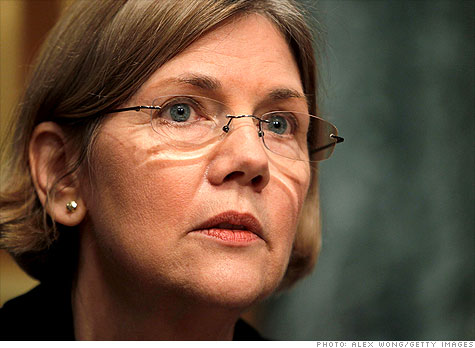Mergers & Bailouts in American History
 |
| Elizabeth Warren |
As some of you know, I am very interested in the various occupy movements that, until recently, were going on all over the country. (Occupy Boston remains in place, as does, by the way, Occupy Harvard.) I sympathize with the general feeling of frustration, and I think it's worth trying to figure out how to express some of those sentiments in a more rigorous way.
Elizabeth Warren, who is currently running for Senate in Massachusetts, must be one of the smartest people in politics. I recently watched a clip of an interview she did with Charlie Rose in which she makes a very compelling argument that's worth thinking about in historical perspective.
Warren basically says that although she agrees the 2008/09 bailout of several large banks, AIG, as well as GM and Chrysler were necessary, it was not executed the right way. The question she poses is this: was the bailout designed to preserve particular institutions, or to preserve the US Economy? "What we did when we rescued these banks," she says, "is that we left the shareholders in tact, we left the top management in tact, we paid their debt in full. We came in and supported the enterprise as it is." This is no way to encourage reform, because it carries serious risks of moral hazard. Bailouts of this kind encourage reckless behavior. Investment banks and others in the financial services industry have reason to believe they can profit if a risky investment pay off whereas they will be bailed out if it does not.
(I like to think of it in statistical terms. Risky decisions are ones with a high variance in payoffs. What bailouts like TARP do is to cut off the negative tail of that distribution, thus biasing the payoff matrix such that it becomes economically rational to take more risks.)
I think Warren is basically on point here. The question I want to ask is why no penalties were imposed on the shareholders of these banks, insurance companies, and auto manufacturers? In the video, Warren herself chalks it up to the "worldview" of those who engineered the bailout. I suspect this is probably true, at least in part. But I'd like to suggest another narrative, one with a more longue durée and structural emphasis.
In the mid to late 19th century, nearly all businesses in the United States were operated by people with a substantial ownership stake in their firm. The major exception here were the railroads, which was arguably 19th century's great speculative enterprise. (It is worth pointing out that the railroad bubble burst several times, and was largely sustained through Government intervention.) But in most other sectors of the economy, there was no great divide between ownership and management.
This all began to change during the great merger movement of the 1890s and early 1900s. As large sectors of the American economy coalesced into a very small number of huge corporate firms, the divide between ownership and management grew increasingly pronounced. The reasons for this are complex, but part of the story is that firms coming out of the merger movement were huge, multiunit, vertically integrated corporations. Their function was so complex that a whole army of salaried managers were needed to coordinate all of their diverse activities efficiently.
A second reason was that as many smaller firms merged into a few very large firms, the role of ownership was transferred from a few people to large corporate boards. Essentially, ownership had become diluted over a large enough group of people that none of them had a majority stake in the whole enterprise anymore. In addition, many major stockholders had interests in a number of different companies at one and the same time. This reduced the incentive for ownership to take the time needed to manage and oversee the day to day operation of its firms.
What's the upshot of all this?
I'm wondering if this growing separation between ownership and management might have something to do with the decision not to punish shareholders for the risks taken by management.
My sense is that in today's world, the historical trend I've been describing has only intensified. Now, rather than a growing number of capitalists having an ownership stake in big firms, a large proportion of the American people do. It's no longer just entrepreneurs who invest in the stock market. Nearly everyone does. If you have a 401K, for example, or belong to a mutual fund, you might well own shares of a company that had to be bailed out in 2008/09. Hence, one reason not to punish shareholders for the reckless behavior of management might be that doing so would essentially entail punishing ourselves.
Of course, as Elizabeth Warren points out, this is bad news for the economy as a whole. If shareholders are not punished when risky investments turn sour, risk-taking is incentivized. Management is rewarded with bonuses and higher salaries for generating high returns on investments. If risk-taking does not come at potential cost, the incentive is to make risky investments and hope for the best.
Of course, what's really ironic here is that in the end we ARE punishing ourselves either way. Ordinary Americans who own stock through their 401K are also the ones whose taxes paid for the bailouts. So the net gain for the vast majority of people who invest in the stock market must have been close to zero. Top management, who also did not have to pay a price for their reckless behavior, however, benefited a great deal. As did the proverbial 1 per cent.


